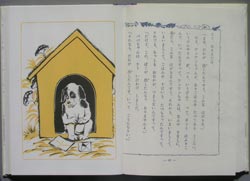This is an anthology of Chiba Shôzô, which set a precedence of stories for younger little children around 1930. Chiba made a story of Wan Wan (Doggie) and told it to his son. He contributed it to the magazine Dôwa [Stories for Children] in 1923. This story and subsequent ones that appeared in the magazines Dôwa and Ryôyû [Good Friends] were published in book form titled Wan Wan Monogatari. It took the style of stories told by "Daddy" to his son who was fond of Doggie. Chiba had four sons and two daughters, whom he called the suppliers of dôshin (child's mind). His association with his children was the important factor
in his creation. Unfortunately he lost his eldest son in 1923 and found
comfort in Buddhist faith. This book became an unexpected requiem for his
late son.
Wan Wan Monogatari contains twelve stories, most of them first appeared in magazines. Daddy
appears in ten stories and has fun in the world of nonsensical infant play,
like having a race with the personified Doggie. Although the son never
appears in the stories, characters just like him or things he is likely
do are set up. It is contrived so that readers can laugh at both Doggie's
and Daddy's silliness.
At the time of publication, Wan Wan Monogatari was not well received, but later Ishii Momoko valued the stories in the book as light and nonsensical narratives rare in Japan, and included two of them in Sekai Jidô Bungaku Zenshû [Collected Works of Children's Literature of the World] Vol.30 (1960). In 1981 Wan Wan Monogatri was published as a pocket book by Poplar Publishing, which has been reprinted many times. It is one of the most important works for younger children in the Taisho era. A reprint of the original was published by Holp Shuppan in 1974. |

